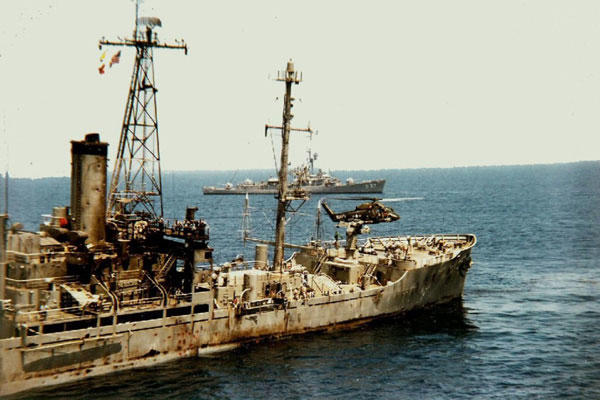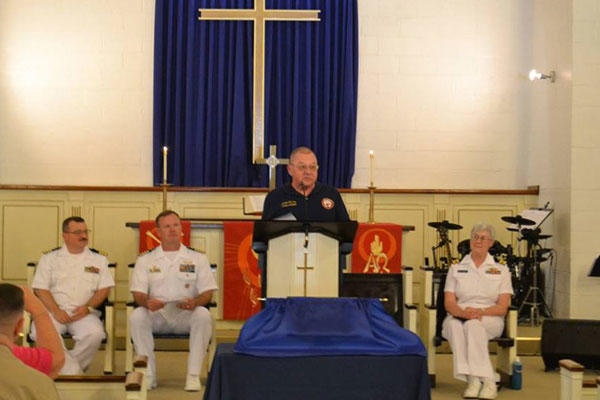Nearly a half century after the USS Liberty -- a lightly armed American spy ship -- was almost sunk by Israeli air and sea forces during the Six Day War, survivors say the U.S. still prefers to avoid dealing with what happened and identifying who attacked the ship.
Strafed by machine-gun fire, hit by napalm and torpedoed over the course of the 75-minute attack, the Liberty has one of the most highly decorated crews in American naval history.
Out of that single action came one Medal of Honor, two Navy Crosses, a dozen Silver Stars, 20 Bronze Stars for valor, nine Navy Commendation Medals, more than 200 Purple Hearts and a Presidential Unit Citation.
But even when the ship is remembered, as it was last month with a rededication of carillon bells at Naval Station Norfolk's chapel, an important part of Liberty's story is avoided: It was attacked by Israel.
"It's probably political," said Terry McFarland, a Liberty survivor who organized a memorial service held Wednesday at Arlington National Cemetery.
"But we still try to make Americans aware of what happened," he added, "for the memory of our shipmates and … and to get a complete and full investigation of all the facts" about the attack.
Transcripts of radio communications between Israeli pilots and their controllers indicate the attackers identified the ship as American yet continued the assault. But U.S. and Israeli officials still claim it was a case of mistaken identity.
Members of the Liberty Veterans Association organize a service annually at Arlington, where six of their dead are buried in a group grave and others, including ship's skipper Capt. William McGonagle, are interred in separate plots.
The U.S. Navy routinely provides a bugler to play Taps for the occasion. Survivors say the sea service offers little else.
Citing the military's failure to identify Israel as the attacker on dozens of awards citations and the Arlington group headstone, to claiming the incident was an "accident" -- an excuse that even the State Department has never officially accepted, Liberty survivors they feel like they've been slighted for almost five decades.
"They don't want to talk about it, they don't want to listen to us, they don't want to do anything," Joseph Meadors, a signalman aboard Liberty during the attack, told Military.com. "They don't want to acknowledge our existence."
The story of the Norfolk chapel Carillon bells in the Navy news publication "The Flagship" is only the latest example of that unwillingness to confront history, they say.
Josie Toth Linen, whose brother Stephen was killed in action on Liberty, called the omission of Israel in the account of the incident "typical." She said, "We've been treated this way since 1967."
Base spokeswoman Kelly Wirfel concedes the omission was deliberate, but said that's because who attacked Liberty was not germane to the story.
"From my point of view, as the base public affairs officer, and the person who edited the story, the purpose of the ceremony was to rededicate the bells. It has nothing to do with the controversy … We wrote the story, someone on my staff, and I'm very proud of the job that [she] did with the story."
Retired Lt. Cmdr. Jim Smith, a Liberty survivor who spoke at the service, doesn't recall either of the other speakers -- Command Chaplain Diane Lantz and NSN Commander Capt. Doug Beaver -- mentioning Israel.
"I don't believe that the plaque even says that," Smith said, referring to the dedication tablet placed in the chapel.
In weeks leading up to the event, he said he spoke to Lantz and asked her if she was meeting any resistance to dedicating the Carillon to the Liberty.
"I told her there are people out there who don't want us broadcasting that it was Israelis who attacked the ship," he said. But she assured him she was not hearing any opposition, he said.
Neither Lantz nor Beaver responded to Military.com's request for comment.
From the start, the attack on Liberty was a political controversy, with a succession of presidents, lawmakers and military leaders showing little or no willingness to fully investigate it. The few lawmakers who pressed for an investigation of the incident have often been dismissed as conspiracy theorists and even anti-Semites.
Just days after the attack, even before a brief Naval Court of Inquiry finished a limited investigation into the case, the Navy was calling it an accident in official telegrams sent to the families of the dead.
The Court limited its inquiry into whether Liberty was where she was supposed to be and how the crew responded to the crisis, though Adm. John S. McCain, commander of U.S. Naval Forces in Europe, concluded the attack was accidental.
The Medal of Honor awarded to Liberty's skipper, Capt. William McGonagle, was presented in a private ceremony at the Washington Navy Yard by Navy Secretary Paul Ignatius -- not at the White House by President Johnson. (At the time of the presentation, wrote James Scott, author of "The Attack on The Liberty," Johnson was in the East Room overseeing the graduation of the Capitol Page School.)
In addition, McGonagle's Medal of Honor citation did not identify Israel as the aggressor -- an omission repeated on all but one of the many award citations (and that, Meadors believes, likely got through by mistake). The attacker was also omitted on a group headstone at Arlington National Cemetery where six of the sailors are buried.
Instead, the citations and the headstone said only that the attack and the deaths occurred "in the Eastern Mediterranean." It was only after sustained pressure from survivors and supporters that the stone was changed to include "Killed USS Liberty." But it doesn't mention Israel.
And while a Pentagon wall display does reference the incident, it suggests Israel mistakenly attacked the ship -- despite the radio chatter that indicated otherwise. For example, the display marking events in military intelligence history references the Liberty using a reproduced headline from The New York Times of June 9, 1967 -- before the court of inquiry had even convened -- declaring "Israel, in error, attacks Navy ship."
Meanwhile, the Navy denies that it dropped Liberty as the planned name of the second Littoral Combat Ship to avoid the controversy. But as previously reported by Military.com, the name appeared high on a list of recommended names to the Navy secretary and the official Naval Vessels Register identified LCS-2 as Liberty before it was changed.
Philip Giraldi, a former CIA case officer and Army intelligence officer who now writes for The American Conservative and other publications, was at the Arlington ceremony on Wednesday, where he met with survivors and their families.
"This was a deliberate attack" by Israel, he said. "But our country has done everything it could to make it appear it was an accident."
McLaren said he's already looking ahead to next year's anniversary of the attack -- the 50th -- when survivors, family and supporters plan to rally at Norfolk, which was Liberty's home port.
"The [Liberty Veterans] Association will continue to talk about the Liberty in the coming years, until none of us are around anymore," he said, "and then hopefully our families will continue on."
-- Bryant Jordan can be reached at Bryant.jordan@military.com. Follow him on Twitter at @BryantJordan.































